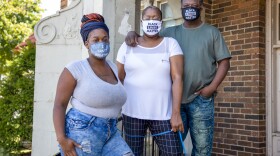Martha Bebinger
[Copyright 2024 NPR]
-
The nation as a whole fell short of President Biden's July Fourth vaccine goal — giving at least one shot to 70 percent of adults. Some states exceeded expectations, and others didn't come close.
-
The practice of housing children who are in psychiatric crisis in local ERs — often for days, while they await appropriate in-patient treatment — has become even more prevalent during the pandemic.
-
Data from a Boston hospital showed that Latino patients who did not speak English well had a 35% greater risk of death from COVID-19. The hospital has added interpretation capacity.
-
As the nation falls far short of a goal to get 20 million vaccinated by the new year, we look at where bottlenecks are occurring in various parts of the country.
-
From heat-related illness to mosquito-borne infections, physicians are seeing the effects of a warming planet in the exam room. There's a growing push to teach doctors-in-training how to respond.
-
A survey of 17 cities found more than 50,000 pandemic-related eviction filings. Housing advocates worry that increased housing instability will lead to more COVID-19 and other illnesses.
-
More than 200,000 people in the U.S. have died of COVID-19. We hear from three areas of the country about how the pandemic has affected life there.
-
Doctors are researching why some patients remain unconscious for days or weeks, even after sedating drugs are withdrawn. They also worry that these patients aren't being given time to recover.
-
The state offers support and resources for people isolating because of COVID-19 — helping them make choices that keep everyone safe. It's work more states need to fund, experts say.
-
"I know we will succeed somewhat and we will fail somewhat," says one of the plan's chief architects. "We won't be able to find every single person — but we will hopefully prevent a lot of deaths."







